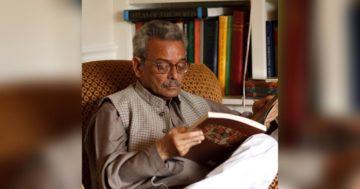Maaz Bib Bilal in Scroll In:
 This annus horribilis is not over yet, and it has now taken away from us the greatest doyen and scholar of Urdu literature the world knew over the recent decades, Shamsur Rahman Faruqi. He died peacefully at his home, surrounded by his family and his favourite dogs, having recovered earlier this month from Covid-19. I had the honour and pleasure to visit him in his study in January this year, which isn’t anything less than a library. It is hard to imagine all those books siting there without their avid reader. Ghalib’s often quoted verse “aisā kahan se laun ki tujh saa kahen jise” – “where do I find another who may be like you?” – doesn’t seem to hold truer than in this moment of the greatest loss for Urdu culture.
This annus horribilis is not over yet, and it has now taken away from us the greatest doyen and scholar of Urdu literature the world knew over the recent decades, Shamsur Rahman Faruqi. He died peacefully at his home, surrounded by his family and his favourite dogs, having recovered earlier this month from Covid-19. I had the honour and pleasure to visit him in his study in January this year, which isn’t anything less than a library. It is hard to imagine all those books siting there without their avid reader. Ghalib’s often quoted verse “aisā kahan se laun ki tujh saa kahen jise” – “where do I find another who may be like you?” – doesn’t seem to hold truer than in this moment of the greatest loss for Urdu culture.
Poet, novelist, critic, literary historiographer, translator, editor, publisher, professor, literary modernist as well as postcolonial revivalist of traditions – it is a long list of literary and cultural roles that he performed exquisitely alongside his job with the Indian postal services till his retirement in 1994 and thereafter. It is tough to prioritise one aspect of Faruqi’s literary impact over the others, but what he brought to all the different sides of his prolific career was the capacity to be a revisionist, a field-changing observer, who managed to change the purviews of aesthetics, criticism, and literary history through his rigorous scholarship.
More here. (Note: Via Bibi)
